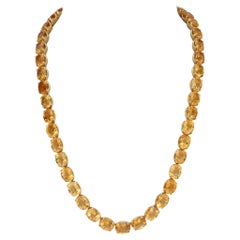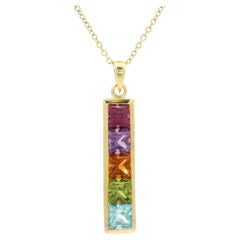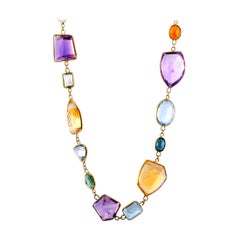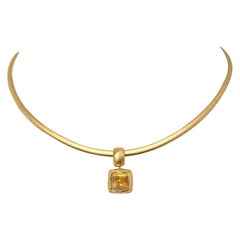H Stern Citrine Necklace
21st Century and Contemporary Link Necklaces
18k Gold, Yellow Gold
21st Century and Contemporary Pendant Necklaces
Amethyst, Citrine, Garnet, Peridot, Topaz, Gold, 18k Gold, Yellow Gold
Recent Sales
21st Century and Contemporary More Necklaces
Amethyst, Aquamarine, Citrine, Garnet, Topaz, Tourmaline, 18k Gold, Yell...
21st Century and Contemporary Pendant Necklaces
Citrine, White Diamond, Yellow Gold
21st Century and Contemporary Pendant Necklaces
Citrine, Diamond, Yellow Gold
Vintage 1980s Brazilian More Necklaces
Amethyst, Citrine, Garnet, Peridot, Topaz, Tourmaline, 18k Gold, Yellow ...
Vintage 1980s Brazilian Drop Necklaces
Amethyst, Aquamarine, Citrine, Garnet, Peridot, Topaz, Tourmaline, 18k G...
Vintage 1980s Brazilian Retro Choker Necklaces
Amethyst, Citrine, Peridot, Tourmaline, Blue Topaz, 18k Gold
Vintage 1980s Contemporary Pendant Necklaces
Amethyst, Citrine, Diamond, White Diamond, Peridot, Topaz, Tourmaline, B...
21st Century and Contemporary Brazilian Link Necklaces
Citrine, 18k Gold, Yellow Gold
21st Century and Contemporary Brazilian Contemporary Choker Necklaces
Citrine, 18k Gold, Yellow Gold
Early 2000s American Modern Multi-Strand Necklaces
Topaz, Tourmaline, Amethyst, Citrine, Diamond, Garnet, Tanzanite, Yellow...
2010s Brazilian Contemporary More Necklaces
Aquamarine, Beryl, Citrine, Quartz, 18k Gold, Yellow Gold
20th Century Brazilian More Necklaces
Citrine, Diamond, 18k Gold
Vintage 1970s Brazilian Drop Necklaces
White Diamond, Citrine, 18k Gold
21st Century and Contemporary Brazilian Pendant Necklaces
Blue Sapphire, Citrine, Diamond, 18k Gold
20th Century Brazilian More Necklaces
Citrine, Diamond, Topaz, Tourmaline, 18k Gold
21st Century and Contemporary Brazilian More Necklaces
Citrine, Diamond, Sapphire, 18k Gold
People Also Browsed
Late 20th Century Brazilian Modern Band Rings
Diamond, 18k Gold, Yellow Gold
Antique 1890s English Choker Necklaces
Amethyst, 9k Gold
Vintage 1970s Beaded Necklaces
Cultured Pearl, Pearl, 18k Gold
Early 2000s Brazilian Fashion Rings
Citrine, Diamond, Quartz, Gold
21st Century and Contemporary Drop Necklaces
Diamond, White Gold, Platinum
21st Century and Contemporary Unknown Contemporary Choker Necklaces
Diamond, White Diamond, Gold, 18k Gold, Yellow Gold
Early 2000s Brazilian Modern Beaded Necklaces
Quartz, Gold, 18k Gold, Yellow Gold
Antique Early 19th Century English Georgian Link Necklaces
Garnet, 15k Gold, 9k Gold, Rose Gold
Vintage 1970s Italian Drop Necklaces
Diamond, Emerald, 18k Gold
21st Century and Contemporary Brazilian Modern Cocktail Rings
Diamond, White Diamond, Gold, 18k Gold, White Gold
21st Century and Contemporary Brazilian Contemporary Link Bracelets
Aquamarine, Diamond, 18k Gold, White Gold
Early 20th Century French Belle Époque More Jewelry
Diamond, Platinum
21st Century and Contemporary Choker Necklaces
Diamond
H Stern Citrine Necklace For Sale on 1stDibs
How Much is an H Stern Citrine Necklace?
H. Stern for sale on 1stDibs
Born into a Jewish family in Essen, Germany, Hans Stern (1922–2007) fled with his parents to Rio de Janeiro at the onset of World War II. There he landed a job working for the precious stone and mineral exporter Cristab. Thus began Stern’s rise to become “the king of the colored gems,” as the media would dub him, and founder of the family-owned H.Stern jewelry business that now has over 150 stores worldwide.
While working for Cristab, Stern regularly visited mines on horseback. At the remote mines of Minas Gerais, Brazil, he cultivated relationships with many of the miners, developing professional connections that would endure for decades. He also embraced a fascination with the colorful semiprecious stones harvested in the area. In 1945, he started his own company, H.Stern, with the goal of marketing Brazilian gemstones — then virtually unknown on the global stage — to an international audience.
Though the company began as a trader in gemstones, it soon expanded to jewelry, with Stern assembling and training a team of young jewelers. A frequent motif in the company’s designs was the star, as Stern is “star” in German. In 1949, H.Stern opened its first jewelry shop in Rio de Janeiro, but a storefront was not his customers’ only view into the brand’s jewelry-making process. In the 1950s, Stern became one of the first major jewelers to offer tours of his workshop, showing off the creative process and elevating the role of craftsmanship in jewelry design.
Stern’s approach and his vibrant jewels, which favored organic settings designed to show off colorful gems, earned international recognition and put Brazil’s topaz, amethyst and tourmaline on the map. Tourmaline was reportedly Stern’s favorite, and the company’s Rio de Janeiro vaults are also home to Paraíba tourmalines, which are mined in the mountains of Paraíba, Brazil. He recognized the burgeoning tourism industry in the country as an opportunity to promote the beauty of these stones, opening stores in the lobbies of Brazil’s leading hotels and investing in vehicles to bring visitors to the H.Stern headquarters. By the mid-1990s, the company was opening stores abroad and selling jewelry at international department stores.
In the 1980s, the brand debuted its first celebrity collaboration, with French actress Catherine Deneuve. Since then it has worked with partners such as designer Diane von Fürstenberg and architect Oscar Niemeyer. In 2016, Assouline published a book on the 70-year history of H.Stern, from its humble founding to its worldwide acclaim. Today, the company is run by Stern’s son, Roberto, who has introduced a broad range of new collections and styles.
On 1stDibs, find a collection of H. Stern necklaces, rings, earrings and other accessories.
Why Gold Shines in Jewelry Craftsmanship
Gold is the feel-good metal, the serotonin of jewelry. Wear vintage and antique gold necklaces, watches, gold bracelets or gold rings and you feel happy, you feel dressed, you feel, well, yourself.
Gold, especially yellow gold, with its rich patina and ancient pedigree going back thousands of years, is the steady standby, the well-mannered metal of choice. Any discussion of this lustrous metal comes down to a basic truth: Gold is elementary, my dear. Gold jewelry that couples the mystique of the metal with superb design and craftsmanship achieves the status of an enduring classic. Many luxury houses have given us some of our most treasured and lasting examples of gold jewelry over the years.
Since its founding, in 1837, Tiffany & Co. has built its reputation on its company jewelry as well as its coterie of boutique designers, which has included Jean Schlumberger, Donald Claflin, Angela Cummings and Elsa Peretti. There are numerous gold Tiffany classics worth citing. Some are accented with gemstones, but all stand out for their design and the workmanship displayed.
For the woman who prefers a minimalist look, the Tiffany & Co. twist bangle (thin, slightly ovoid) is stylishly simple. For Cummings devotees, signature pieces feature hard stone inlay, such as her pairs of gold ear clips inlaid with black jade (a play on the classic Chanel black and tan), or bangles whose design recalls ocean waves, with undulating lines of lapis lazuli and mother-of-pearl. And just about any design by the great Jean Schlumberger is by definition a classic.
Even had he eschewed stones and diamonds, Southern-born David Webb would be hailed for the vast arsenal of heavy gold jewelry he designed. Gold, usually hammered or textured in some manner, defines great David Webb jewelry. The self-taught jeweler made very au courant pieces while drawing inspiration from ancient and out-of-the-way sources — East meets West in the commanding gold necklaces made by Webb in the early 1970s. The same could be said for his endlessly varied gold cuffs.
In Europe, many houses have given us gold jewelry that sets the highest standard for excellence, pieces that were highly sought after when they were made and continue to be so.
Numerous designs from Cartier are homages to gold. There are the classic Trinity rings, necklaces and bracelets — trifectas of yellow, white and rose gold. As a testament to the power of love, consider the endurance of the Cartier Love bracelet.
Aldo Cipullo, Cartier’s top in-house designer from the late 1960s into the early ’70s, made history in 1969 with the Love bracelet. Cipullo frequently said that the Love bracelet was born of a sleepless night contemplating a love affair gone wrong and his realization that “the only remnants he possessed of the romance were memories.” He distilled the urge to keep a loved one close into a slim 18-karat gold bangle.
BVLGARI and its coin jewelry, gemme nummarie, hit the jackpot when the line launched in the 1960s. The line has been perennially popular. BVLGARI coin jewelry features ancient Greek and Roman coins embedded in striking gold mounts, usually hung on thick link necklaces of varying lengths. In the 1970s, BVLGARI introduced the Tubogas line, most often made in yellow gold. The Tubogas watches are classics, and then there is the Serpenti, the house's outstanding snake-themed watches and bracelets.
A collection called Monete that incorporated the gold coins is one of several iconic BVLGARI lines that debuted in the 1970s and ’80s, catering to a new generation of empowered women. Just as designers like Halston and Yves Saint Laurent were popularizing fuss-free ready-to-wear fashion for women on the go, BVLGARI offered jewels to be lived in.
Since Van Cleef & Arpels opened its Place Vendôme doors in 1906, collection after collection of jewelry classics have enchanted the public. As predominantly expressed in a honeycomb of gold, there is the Ludo watch and accessories, circa the 1920s, and the golden Zip necklace, 1951, whose ingenious transformation of the traditional zipper was originally proposed by the Duchess of Windsor. Van Cleef's Alhambra, with its Moroccan motif, was introduced in 1968 and from the start its popularity pivoted on royalty and celebrity status. It remains one of VCA’s most popular and collected styles.
Mention must be made of Buccellati, whose name is synonymous with gold so finely spun that it suggests tapestry. The house’s many gold bracelets, typically embellished with a few or many diamonds, signified taste and distinction and are always in favor on the secondary market. Other important mid-20th-century houses known for their gold-themed jewelry include Hermès and Ilias Lalaounis.
Find a stunning collection of vintage and antique gold jewelry on 1stDibs.
Finding the Right Necklaces for You
We are fortunate to know much of the world’s long and dazzling history of necklaces, as this type of jewelry was so treasured that it was frequently buried with its owners. Today, Van Cleef necklaces, Tiffany necklaces and Cartier necklaces are some of the most popularly searched designer necklaces on 1stDibs.
Lapis lazuli beads adorned necklaces unearthed from the royal graves at the ancient Iraqi civilization of Sumer, while the excavation of King Tut’s burial chamber revealed a sense of style that led to a frenzy of Art Deco designs, with artisans of the 1920s seeking to emulate the elegant work crafted by Ancient Egypt’s goldsmiths and jewelry makers.
In ancient times, pendant necklaces worn by royalty and nobles conferred wealth and prestige. Today, wearing jewelry is about personal expression: Luxury diamond necklaces exude confidence and can symbolize the celebratory nature of a deep romantic relationship, while paper-clip chain-link necklaces designed by the likes of goldsmith Faye Kim are firmly planted in the past as well as the present. Kim works exclusively with eco-friendly gold, and these fashionable, fun accessories owe to the design of 19th-century watch fobs.
For some, necklaces are thought of as being a solely feminine piece, but this widely loved accessory has been gender-neutral for eons. In fact, just as women rarely took to wearing a single necklace during the Renaissance, men of the era layered chains and valuable pendants atop their bejeweled clothing. In modern times, the free-spirited hippie and counterculture movements of the 1960s saw costume-jewelry designers celebrating self-expression through colorful multistrand necklaces and no shortage of beads, which were worn by anyone and everyone.
Even after all of these years, the necklace remains an irrefutable staple of any complete outfit. Although new trends in jewelry are constantly emerging, the glamour and beauty of the past continue to inform modern styles and designs. In a way, the cyclical history of the necklace differs little from its familiar looped form: The celebrated French jewelry house Van Cleef & Arpels found much inspiration in King Tut, and, now, their Alhambra collection is a go-to for modern royals. Vintage David Webb necklaces — whose work landed him on the cover of Vogue in 1950, two years after opening his Manhattan shop — were likely inspired by the ornamental styles of ancient Greece, Mesopotamia and Egypt.
On 1stDibs, browse top designers like Dior, Chanel and Bulgari, or shop by your favorite style, from eye-catching choker necklaces to understated links to pearl necklaces and more.



